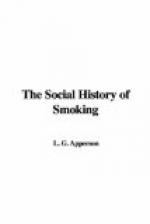In a World of 1755 there is a description of a noisy, hearty, drinking, devil-may-care country gentleman, in which it is said, “he makes no scruple to take his pipe and pot at an alehouse with the very dregs of the people.” In a Connoisseur of 1754 a fine gentleman from London, making a visit in a country-house, is taking his breakfast with the ladies in the afternoon, when they had their tea, for, says he, “I should infallibly have perished, had I staied in the hall, amidst the jargon of toasts and the fumes of tobacco.” When Horace Walpole was staying with his father at his Norfolk country-seat, Houghton, in September 1737, Gray wrote to him from Cambridge: “You are in a confusion of wine, and roaring, and hunting, and tobacco, and, heaven be praised, you too can pretty well bear it.” But Gray had no objection to tobacco. He lived at Cambridge, and the dons and residents there (as at Oxford), not to speak of the undergraduates, were as partial to their pipes as the men who went out from among them to become country parsons, and to share the country squire’s liking for tobacco. Gray wrote to Warton from Cambridge in April 1749 saying: “Time will settle my conscience, time will reconcile me to this languid companion (ennui); we shall smoke, we shall tipple, we shall doze together”—a striking picture of University life in the sleepy days of the eighteenth century. Gray’s testimony by no means stands alone. In November 1730 Roger North wrote to his son Montague, then an undergraduate at Cambridge, saying: “I would be loath you should confirm the scandal charged upon the universities of learning chiefly to smoke and to drink.”
At Oxford in early Georgian days a profound calm—so far as study was concerned—appears to have prevailed. Little work was done, but much tobacco was smoked. In 1733 a satire was published, violently attacking the Fellows of various colleges. According to this satirist the occupation of the Magdalen Fellow was to
drink,
look big,
Smoke much, think little,
curse the freeborn Whig—
from which it may not unreasonably be surmised that the author was a Tory; and however little enthusiasm there may have been at Oxford in those days for learning and study, there was plenty of life in political animosities.
Another witness to the dons’ love of tobacco is Thomas Warton. In his “Progress of Discontent,” written in 1746, he plaintively sang:
Return, ye days when endless pleasure I found in reading or in leisure! When calm around the Common Room I puff’d my daily pipe’s perfume! Rode for a stomach, and inspected, At annual bottlings, corks selected: And dined untax’d, untroubled, under The portrait of our pious Founder!
Warton and another Oxford smoker of some distinction—the Rev. William Crowe, who was Public Orator from 1784 to 1829—are both said to have been, like Prior, rather fond of frequenting the company of persons of humble rank and little education, with whom they would drink their ale and smoke their pipes.




